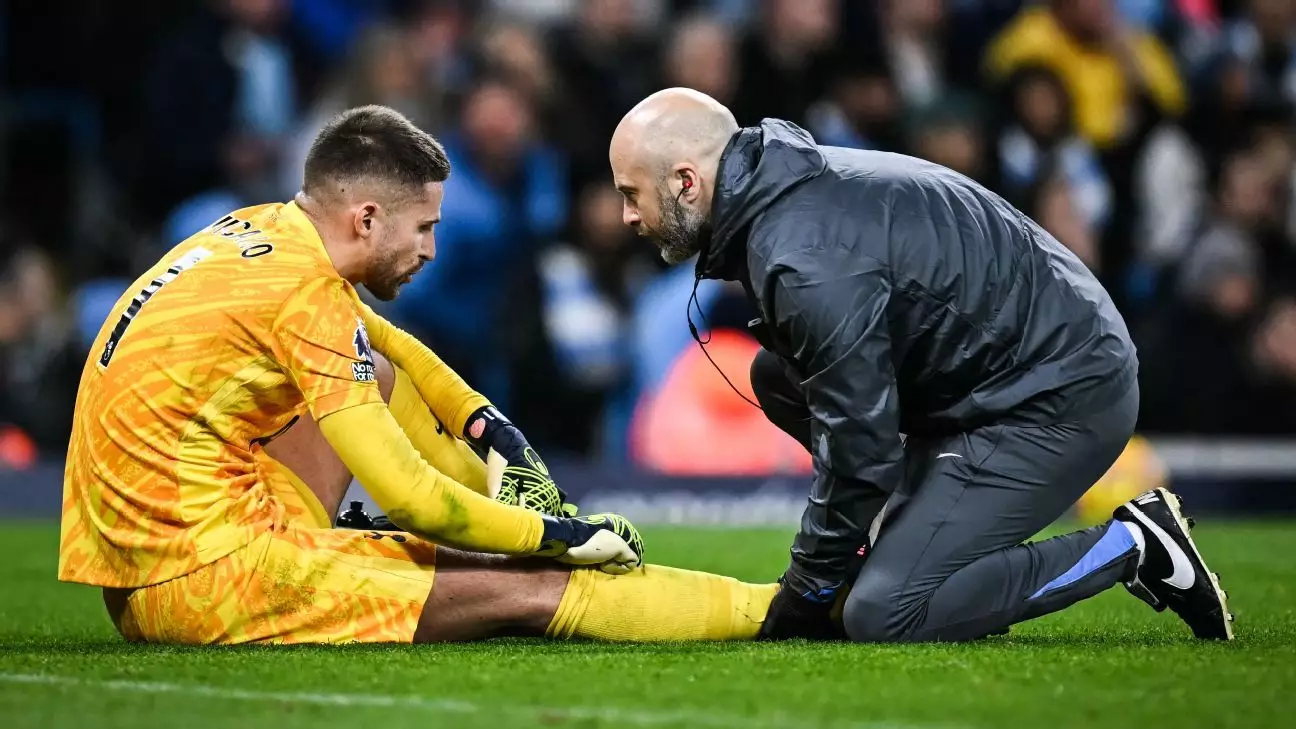The world of sports is filled with unpredictability, and recent events surrounding Tottenham Hotspur have highlighted just how challenging a single match can affect a team’s trajectory. Following the club’s resounding 4-0 victory over Manchester City, Spurs’ manager Ange Postecoglou expressed his astonishment regarding an unexpected injury to goalkeeper Guglielmo Vicario. The 28-year-old’s performance was impressive; however, what many did not realize until after the match was that he had sustained an ankle fracture during a collision. This incident not only underscores the physical toll that competitive sports can impose but also showcases the extraordinary resilience of players who frequently push their limits.
Vicario’s determination was evident throughout the match. The Italian international continued to guard the Spurs’ goal despite significant discomfort. His participation, culminating in a full 90 minutes of play while battling a fractured ankle, is a testament not only to his skill but also to his mental fortitude. As Postecoglou noted, Vicario is “tough as nails,” illustrating that professional athletes often possess an inner strength that allows them to confront pain and adversity head-on. Such resilience is admirable and serves as an inspiration for both teammates and fans alike. It raises poignant questions about the nature of athleticism: how much pain is acceptable, and how far are athletes willing to push themselves for the love of the game?
In the wake of Vicario’s injury, the managerial perspective becomes crucial. Postecoglou had to approach this setback on multiple fronts, balancing genuine concern for Vicario’s well-being, the immediate strategic adjustments required, and the long-term implications for the team’s performance. It’s been confirmed that Vicario will be out for months, a significant period that could shape the squad’s goals moving forward. Notably, Postecoglou appeared pragmatic regarding the situation, stating the team’s resolve to tackle such setbacks, indicating a prepared mindset to adapt and innovate in response to personnel changes.
The decision not to pursue immediate reinforcements for the goalkeeping position further highlights a philosophy of trust in existing squad members, particularly Fraser Forster. As a seasoned player, Forster’s experience becomes invaluable in maintaining the team’s competitive edge during Vicario’s absence. Postecoglou’s confidence in him to fill the void emphasizes a strategy rooted in continuity and cohesion rather than disruptive changes.
Adding another layer of narrative to the context, Tottenham will soon face AS Roma, which will further test the squad’s depth and resilience. The strategic confrontation with managerial veteran Claudio Ranieri serves as a reminder of the rich history and continuity within football. Ranieri, despite facing his own challenges, embodies the persistence of tactical wisdom that excels with experience. Postecoglou acknowledged Ranieri’s illustrious career and the impact he has had on the game, which shows a mutual respect among managers. This upcoming match is not merely an athletic contest; it encapsulates a historical exchange filled with stories of perseverance and adaptation.
As Tottenham navigates the ramifications of Vicario’s injury, the club faces a pivotal moment. The need to rally the team, maintain a competitive spirit, and ensure positive morale will be essential. Postecoglou’s leadership style—emphasizing strength through adversity—will be tested as he maneuvers through this challenging phase. A cohesive unit that believes in each other’s abilities, regardless of individual injuries, will be fundamental as Spurs aim to maintain their standing in domestic and European competitions.
The incident surrounding Guglielmo Vicario provides significant insights into the challenges of competitive sports, the nature of resilience, and the art of management in the face of adversity. Tottenham’s journey will undoubtedly continue to be shaped by these experiences, and it remains to be seen how they will adapt to the evolving landscape of their current season.

Leave a Reply